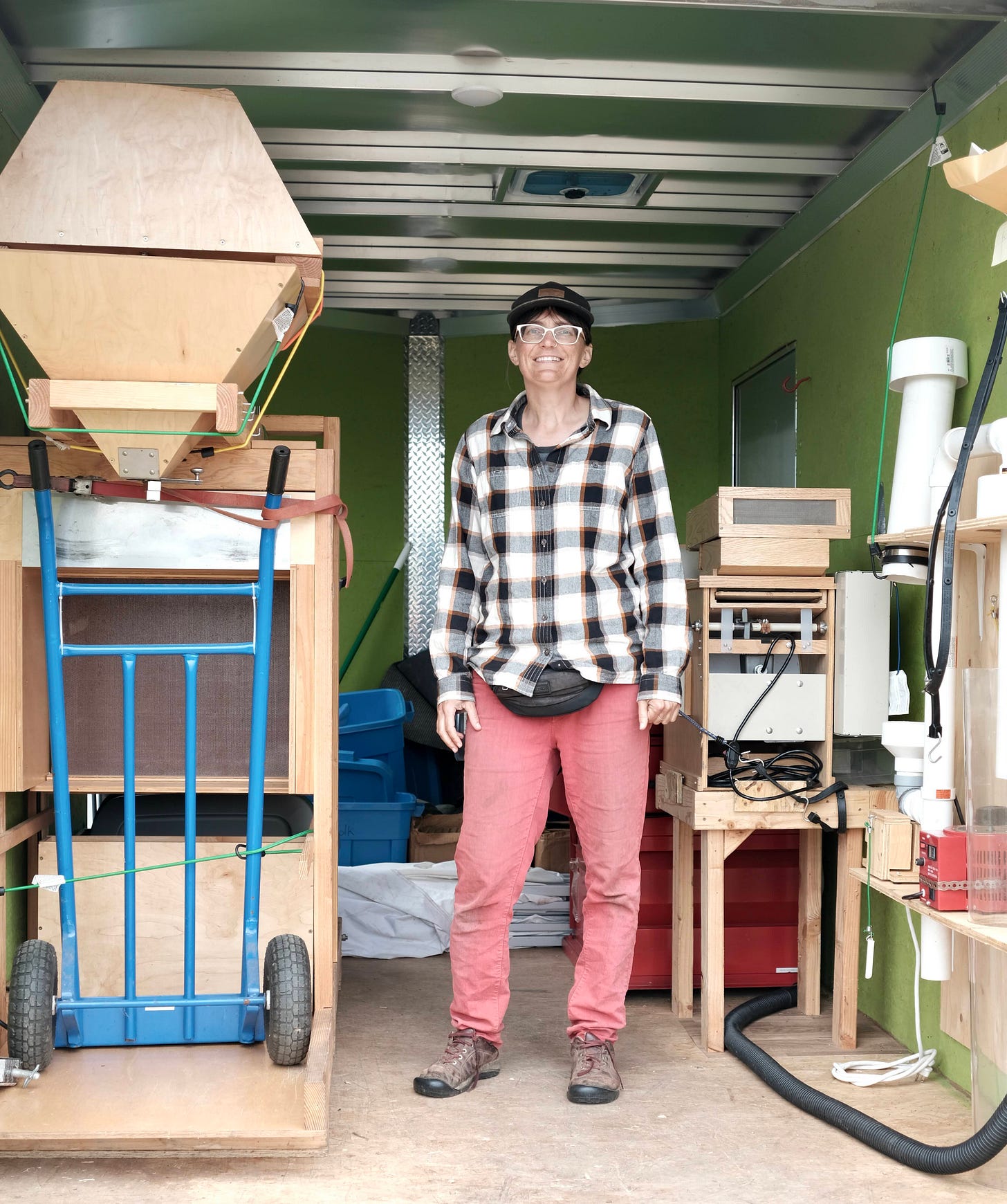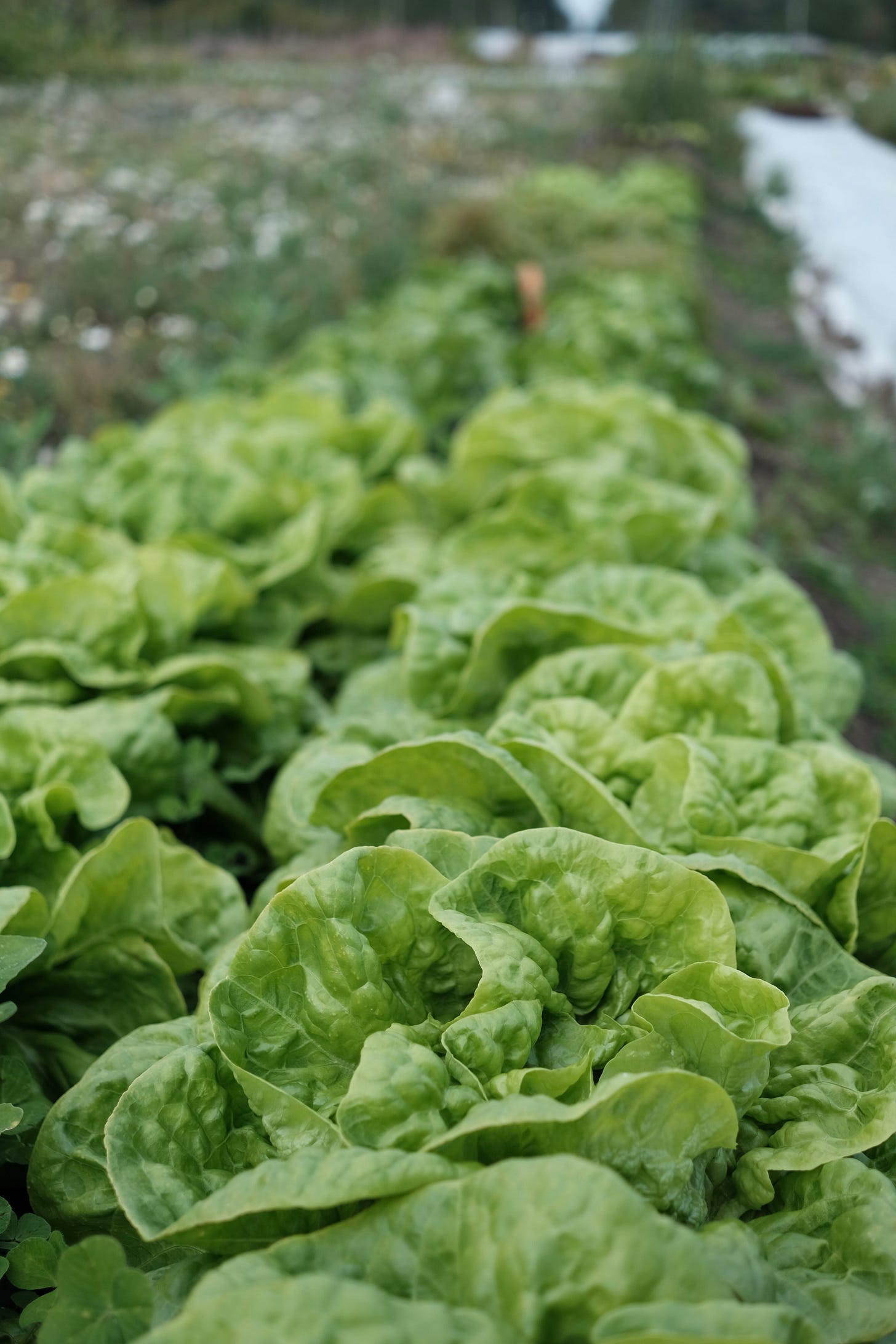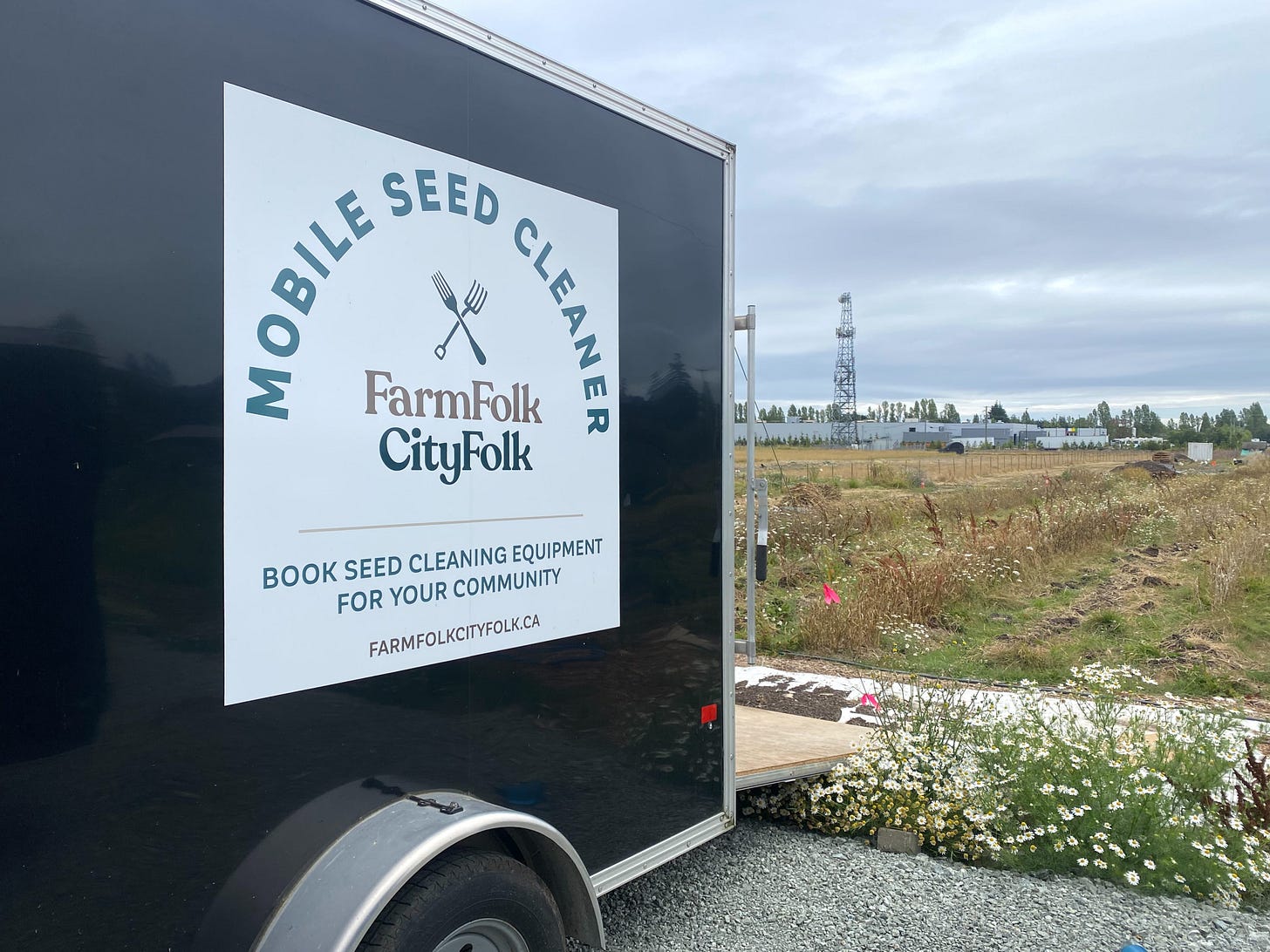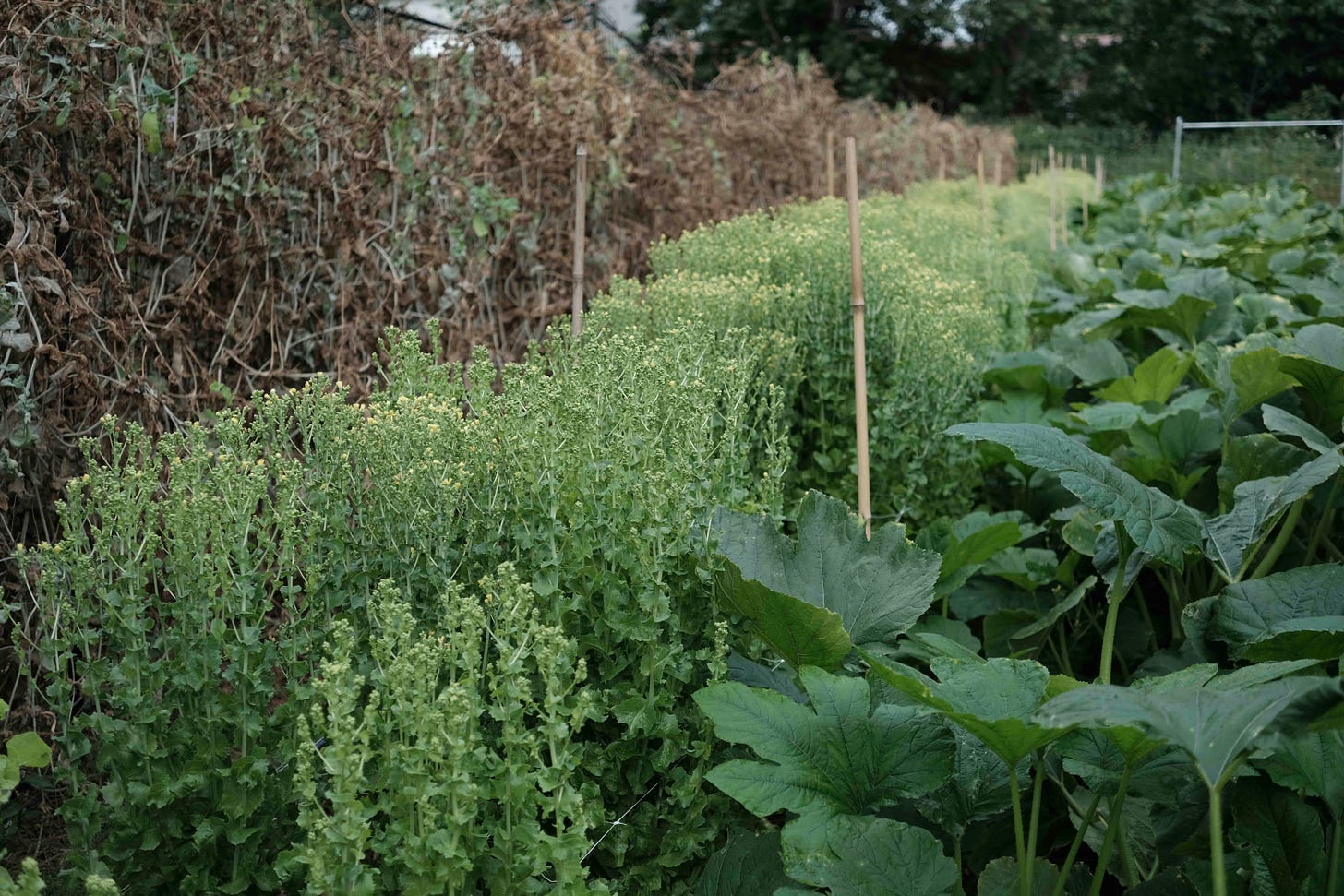British Columbia is Canada’s western most province and is almost four times the size of the United Kingdom. With limited time to explore this area of the Pacific Northwest, I left the delights of Fraser Common Farm to catch another ferry across the water to Vancouver Island, home of B.C’s capital, and yet another thriving seed community.
My first stop on the island was to meet with Lisa Willott, David Catzel’s colleague and fellow FarmFolk CityFolk Seed Security Programme Coordinator, whose role it is to connect the seed growers based here. Lisa is based at the Sandown Centre of Regenerative Agriculture in North Saanich on southern Vancouver Island where she carries out many of the trials and breeding work on the ¼ acre she manages there. Similarly to David, Lisa works with farmers and community groups across the island, connecting and collaborating to foster a resilient, sustainable and equitable food system in B.C.
Lisa and I spent the morning together walking her plot at the farm and discussing many of the trials she had been running this year, including some of the heat tolerant lettuce trials that I’d also seen growing at Fraser Common Farm. It was so interesting to have the opportunity to compare the two trial locations, and observe the differences in plant performance first hand. Only a short journey across the water, and the varieties that were doing well for Lisa were very different to those that were thriving on the mainland. It was a great demonstration of how important these trials are to really home in on regional adaptation and resilience.
During my visit, I also had the chance to see one of the much talked about FarmFolk CityFolk mobile seed cleaning trailers. Lisa was in the throes of planning the autumn tour with the island trailer, and it was currently being tidied and primed ready for its journey. Lisa will spend several weeks on the road from September, touring the main island as well as some of the smaller surrounding islands, making stops at seed farms, community groups and anyone else who needs help with cleaning their seed. Inside the trailer was a veritable treasure trove for any seed enthusiast! The Winnow Wizard took centre stage, alongside a Clipper, a vacuum seed cleaner and a thresher. Then there were the array of sieves, screens and other paraphernalia essential for the seed cleaning process. FarmFolk CityFolk have devised a set of handy ‘how to’ guides for all of the on-board equipment, making this trailer incredibly accessible for anyone who needs to use it. The trailer is a lifeline for many seed growers on the island who would otherwise have to rely on cleaning all their seed by hand. Practical benefits aside, the seed cleaning tour also offers a unique opportunity for Lisa to connect in person each year with her wider seed community. The tour provides a chance to engage with farmers across the islands and share news and bring stories of others within the network. It’s also somewhat of a talking point and does a fantastic job of drawing attention from members of the public, stimulating important conversations about seed saving and offering an opportunity to showcase the benefits of locally grown seed.
One of the farms who rely on the mobile cleaning trailer each season are Good Earth Farms Seeds in the Comox Valley, so while I was in the area I arranged to drop by for a visit. As a small company, Good Earth Farm Seeds have limited infrastructure for seed cleaning, so the FarmFolk CityFolk mobile trailer has been a huge help to their business and enables them to do the bulk of their seed cleaning when it passes through the region each Fall.
Simon and Heather Toole started farming in 2004 - initially combining market farming with seed growing, they shifted the focus of their business entirely to seed 4 years ago. They offer a catalogue of around 65 varieties of organic vegetables flowers and herbs, all grown by themselves at their farm in Black Creek on the eastern side of Vancouver Island. They sell their seeds online and at several stores across Vancouver Island, as well as offering an on-farm pick up service. And as part of the B.C seed community, they also grow for the B.C Eco Seed Co-op. When I visited, the rows of pea seeds were in their final throes, the courgettes were gigantic, and racks upon racks of seed were drying down ready for the arrival of the cleaning trailer in a few weeks.
Throughout my travels I have often circled back to relationship being at the heart of seed sovereignty. Encouraging more people to explore their relationship to seed seems vital for future resilience, as does inspiring more seed keeping. But ensuring the quality and vitality of that seed is also an important part of the story. Good Earth Farms Seeds is a meticulously managed seed farm – Heather and Simon care deeply about the quality of their seed and steward their crops accordingly so that they can offer the most resilient and abundant varieties suitable for this very specific climate. They grow vegetables that they find delicious, herbs and flowers that have purpose and connection, and Heather brings the wisdom of her indigenous ancestry to all their seed keeping practices.
During my short time with Simon, a large part of our conversation was centred around that increase in quality that can come from having a local, thriving seed system. Small scale regional seed companies are competing against the global seed giants, so customers need a reason to look beyond the packets that dominate every rack in every store. This is where relationship and stories come in, not only do they offer something unique and relatable to the customer – a USP so to speak - the connection and seeds stories often found in these local networks can ultimately impact seed quality, as there tends to be more love, care and dedication poured into their stewardship. As Simon perfectly summarised, investing in local seed is like purchasing ‘hand crafted furniture vs Ikea furniture’. This intentional seed saving can give rise to healthier, more vibrant, and higher quality seed. Then there’s the longevity – open pollinated varieties can be grown in perpetuity by the community–evolving to the local climate and growing from strength to strength. But there also needs to be systems in place to ensure this high quality, reliability and consistency for the customer: a reason to look beyond the corporate giants.
To ensure high quality of their seed, Simon and Heather have invested time and energy into building soil health at their farm, creating optimum growing conditions to produce the most vigorous plants. Understanding soil as the foundation that supports life, they use a minimum tillage approach, applying inoculants, utilising cover crops and woodchip mulches to increase biological life in the soil, and they try to work in harmony with the living communities they share the land with. This is intentional stewardship, and as we walked around their farm, the crops were clearly benefitting from this care. There was barely a hint of powdery mildew on any of the maturing courgette plants, almost unheard of in a maritime climate like this, and all of the plants I observed were flourishing.
As well as experimenting with regenerative management practices, Simon has also been discussing potential ‘vigour test’ trials with the University of British Columbia, with the aim of gathering scientific data to prove how good stewardship can lead to improved quality and longevity of seeds. As he pointed out, the current germination testing required for a seed packet is a bit of a grey area - ‘a seed may germinate, but will it necessarily grow into a thriving plant?’ Is a germ test result a true reflection of the potential vigour of the plant that will emerge? And in what context?
Simon’s concerns about quality and the current state of our seed system were tangible. ‘It comes down to the fact that we fundamentally undervalue food, and seed is a bi-product of that. We seem to have a culture of fundamentally undervaluing.’ Farm labour is regarded by many as unskilled work, and the price on the seed packet rarely reflects the skill, environmental impact or work that went into producing it. The benefits of local seed systems can be exponential, but how do we make this work economically viable for all? Simon reflected: ‘We’re trying to plug this beautiful thing into a capitalist system.’
Good Earth Farms Seeds are dedicated to organic and regenerative practices that not only improve the quality of their seeds, but also health of wider ecosystems. The value in locally grown seed can be far reaching, and shifting the narrative of our current seed system seems to hinge on people recognising that value beyond the price on the seed packet. This shift requires education, inviting people into an alternative, more regional way of operating, and the work of organisations such as FarmFolk CityFolk feels essential to empowering this change. In supporting seed farmers like Simon and Heather to produce a higher quality end product through initiatives like the seed cleaning trailer, but also in creating opportunities to engage with the wider community and educate folks far and wide about the importance and wider impact of quality, locally grown seed.









